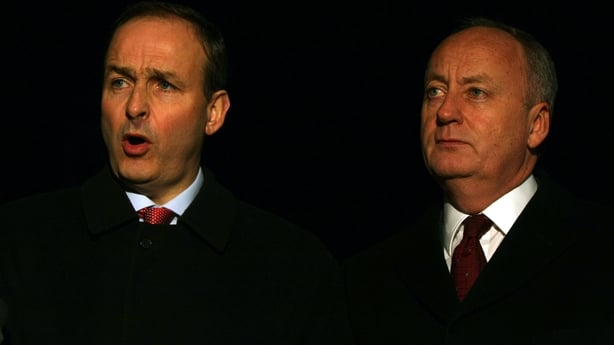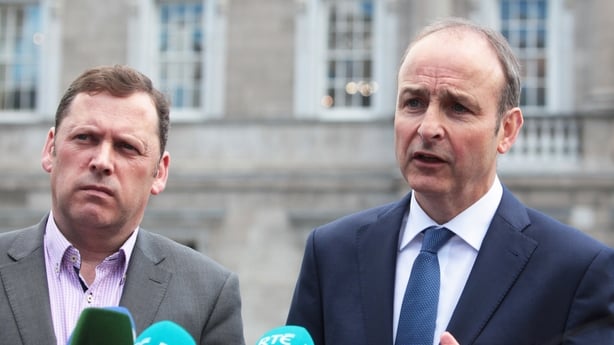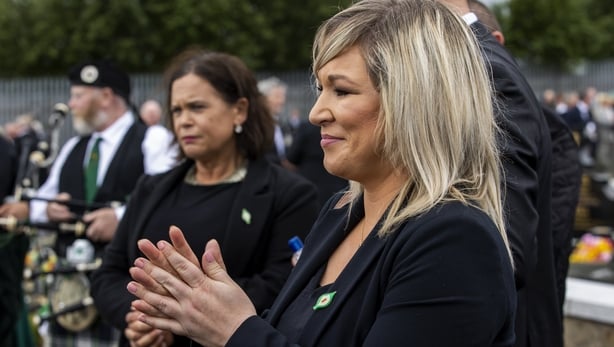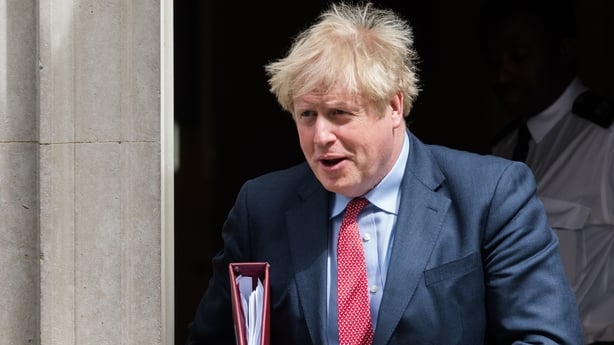When Micheál Martin was Minister for Foreign Affairs (2008-2011), he once found himself in Hillsborough Castle with the then Northern Ireland secretary Shaun Woodward.
They were trying to nudge the Stormont parties towards cutting a deal on the devolution of justice and policing.
It was painfully slow work but the pair realised that if they called a halt to the discussions, the little bit of progress made might disappear and the parties could revert to their default position - argumentative mode.
An Irish diplomat was given the nod to slip over to the Marks and Sparks outlet in the nearby Sprucefield Centre for 'jocks, socks and shirts' supplies.
After the shopper returned, Micheál and his officials were good to go for another few rounds of – (one of his favourite phrases) – ‘going forward’.

Those negotiations played a significant part in the agreement that was struck in February 2010. The magic happened because there was buy-in from the DUP and Sinn Féin.
Mr Woodward’s boss at the time was Gordon Brown. Mr Martin’s line manager was Brian Cowen. The leaders of the two governments came to Hillsborough for the ‘showbiz’ stage. But they were quick to acknowledge the critical preparatory work overseen by their two ministers.
In his new role as Taoiseach Micheál Martin will today cross the border and return to Northern Ireland, two days after he sacked Brian Cowen’s younger brother.
Read more
Martin to meet Northern Ireland's leaders at Stormont
The burden of leadership
For much of his political life Micheál Martin has displayed a capacity to remain calm and logical while angry, emotive noise took centre stage. He seemed to dislike full-blooded rows. His instinct is to find a compromise. A third way.
In health, where much of the friction is caused by the Boston v Berlin row, the private practice v public health system tension, Micheál became a champion of the Treatment Purchase Fund. It paid private hospitals, sometimes involving consultants with a salary in the State system, to carry out procedures on patients, on hold in the public waiting list queue.
The foreign affairs crew grew very fond of him – he is, in some ways, like one of their own. He studies his brief. He is courteous and reasonable.
When sadness came to their door, his family showed commendable dignity. Respect for him and empathy towards him were universal at that time.
But since he became Fianna Fáil leader in January 2011, as holder of the poisoned chalice/keeper of the flame, he has been bedevilled by Fianna Fáil plumbing issues.
Bertie Ahern resigned from the party (before he was pushed); De Valera’s grandson Éamon Ó Cuív was marginalised; Ray MacSharry’s son was overlooked; Willie O’Dea and John McGuinness were bypassed; Jim O’Callaghan was deemed surplus to requirements; Sean Calleary’s son Dara was given the wooden spoon on Cabinet prize day (corrected yesterday) and Brian Cowen’s brother was fired.

In recent days, when Fianna Fáil, (marginally the lead party in government) was floundering, Fine Gael and Leo in particular shone and the Greens avoided controversy.
It’s quite a statement that the Taoiseach might genuinely be looking forward to making his way to the Stormont estate for a bit of relief and a chance to recalibrate.
Seeking political respite... in Stormont
One of the truths about most crises is if you bend but don’t break, there is a chance you will emerge stronger. And wiser. Provided you don’t go under, storm clouds pass. If you can manage to remain upright, the trouble will eventually move on to some other door.
That must be the hope of Mr Martin as he heads north this morning. Belfast today, then onto a summit in Brussels. Top of the heap indeed. But it’s some heap.
The Northern Ireland issues certainly have the capacity to take his mind off ‘the stuff below’. His meeting with Arlene Foster and Michelle O’Neill at Stormont Castle will be a chance for the First and Deputy First Ministers to begin rebuilding their relationship following their spat about Sinn Féin’s involvement in the Bobby Storey funeral.
It’s only four months since the ‘Cash for Ash’ Inquiry report was published. The DUP leader, Arlene Foster, and a number of her advisors and party colleagues came in for most scrutiny in that inquiry. Ms Foster acknowledged in the course of the investigation that she had not adequately studied some of the costly policy initiatives she introduced.
In the Bobby Storey funeral controversy, the DUP were on the front foot as Sinn Féin came under scrutiny. Ms Foster showed some awareness of what it is like to be in the stocks. But she and others upped the heat on Ms O’Neill a number of times.

Yet the DUP leader was also convincingly clear in her condemnation of sectarian activity around loyalist bonfires. Even when she was cold-shouldering Ms O’Neill, she remained adamant that the DUP would be remaining in government.
A very obvious, sensitive element of this afternoon’s discussions will be around north/south approaches to the pandemic emergency. With Ms O’Neill still nursing her wounds over the funeral attendance controversy, Ms Foster convened a news conference near her Fermanagh home last Thursday.
She used it to announce Northern Ireland would be following the example of England by permitting an extensive list of foreign nationals arrive at ports and airports without restrictions.
This is a different approach to the policy south of the border. Northern Ireland is the very open back door on the island of Ireland.
It will be interesting to see how hosts and visitor deal with this issue in private and in public today.
Is caring sharing?
The language around north/south relationships, in the context of Brexit, has become fascinating. And fluid. Nuance is at the heart of what’s going on. For decades Fianna Fáil branded itself ‘the Republican party.’ It traced its roots to the leaders of the 1916 Rising and beyond.
Fine Gael, the pro-Treaty champions, made overtures to nationalists in the lifetime of the last government. Unionists were not happy when the then Tánaiste and Minister for Foreign Affairs Simon Coveney made it known he would like to see a United Ireland in his lifetime. Those same unionists took note when Leo Varadkar stated to the nationalist people of Northern Ireland "you will never again be left behind".
Last month, very senior DUP and Ulster Unionist members were relieved when the "united islanders" of Fianna Fáil (and Fine Gael) put their signatures to a "shared island" strategy in the policy document they agreed with the Green Party last month.
It is a sharp contrast to the Sinn Féin view that a border poll should be held, sooner rather than later, to address the constitutional issue. Some say the Greens were vocal advocates of the "shared" rather than "united" approach.
While Mr Martin was struggling with Fianna Fáil "family issues" last week, his measured, safe hands instincts kicked in on Northern Ireland. The Sinn Féin president and the main opposition leader, Mary Lou McDonald, will have a huge role in how he fares in Dáil Éireann. But he passed on several media opportunities to have a cut at her colleague, Ms O’Neill, over the Storey funeral row in Northern Ireland.
If the early trends continue, he seems committed to being a Fianna Fáil leader at war with Sinn Féin in Dáil Éireann but a Taoiseach open to cordial, helpful relations with a Sinn Féin deputy first minister in Stormont.
Neighbours and their challenges
There is a sanitised version of the story about the two cranky neighbours who died at the same time and headed into the next life.
Farmer One arrived at the pearly gates and was met by a frowning St Peter, inspecting the accounts book. Peter looked at the man who had a large sack of potatoes by his side.
"You’ve done some good work in your life" said Peter. "But you were constantly involved in rows with your neighbour. Before I can let you enter this place, you have to eat every one of those spuds."
The man went quiet but then began to laugh out loud.
Peter was puzzled by the behaviour and demanded to know the reason for the laughter. The farmer was delighted to explain.
"Spuds, I can manage, but my useless next door neighbour who annoyed me all of my life is just behind me. And he has a sack, heaving with turnips."
Mr Martin may not feel it just now, but in relative terms, in the Brexit drama involving the island of Ireland and its nearest neighbour, he may be the political leader carrying the lighter load.
On Friday 29 May, the British government announced that it may be providing UK citizens’ rights to almost three million disgruntled Hong Kong residents (and their dependents).
The British Nationals Overseas passport initiative is the backwash of Britain’s colonial past and its obligations to those Hong Kong residents caught up in the ongoing dispute with China.

On Tuesday, as the Barry Cowen controversy was coming to a climax, Boris Johnson announced the severing of all UK business links with the Chinese telecommunications company, Huawei.
It was a multi-billion pound policy U-turn. The rupture was sought by US President Donald Trump and encouraged by several influential Conservative MP’s, including a former leader, Iain Duncan Smith.
It will render useless 3G, 4G and 5G and other infrastructure. The roll out of broadband services, 5G included will be significantly delayed and UK/China relations are badly damaged.
The range of the challenges facing Mr Johnson is staggering. His government struggled with the pandemic and it has not gone away. The economic indicators, including job losses are borrowings, are intimidating. There is no sign of a Brexit masterplan, the most significant policy shift since the UK joined the European Union.
It must be irritating Boris that slim, young, handsome, married into big money, teetotaller, Chancellor, Rishi Sunak, keeps sparkling on the media stage while Boris tries exchanging elbow knocks with startled workers.
Boris, not Micheál Martin, is the one who will have to dispose of the sack full of turnips.
No time limits or deadlines
Mary Lou McDonald was, by her own standards, restrained in Dáil Éireann on Tuesday afternoon. In her questioning of Mr Martin over Barry Cowen’s difficulties she was careful to simply test a brick or two in the wall. This and the probings of a small handful of other opposition TDs were sufficient to encourage the wobble.
The case can be made that the Fianna Fáil leader is displaying his own expertise in light touch behaviour north of the border. Ultimately unionists are the only ones who can make up their own minds about their long-term future.
Like all of us, during the continuing Covid-19 emergency they are guided by the most basic of instincts, the desire to stay alive. They will observe the strategies and results across the water. They can compare them to what’s happening across the border.
Soon Brexit will become a reality and all of Northern Ireland’s citizens will again have their own opportunity to make comparisons and judgements about the UK and the EU (Ireland included).
History is shaped by events. Never mind the unknowns, Brexit is guaranteed to trigger a chain of changes that will have profound consequences.
Micheál Martin has a little over two years in his role as Taoiseach and, possibly, as Fianna Fáil leader. But in relation to Northern Ireland, he is unlikely to be deflected from his instincts to proceed slowly.
And to see how unionist mindsets are shaped by events.
This may be one crucial difference between Fianna Fáil (the Republican Party) and Sinn Féin.






